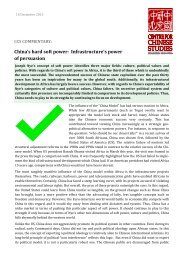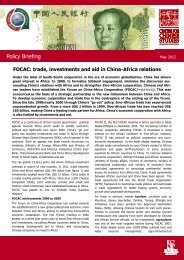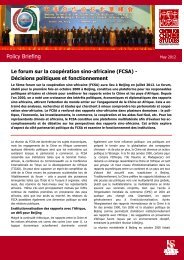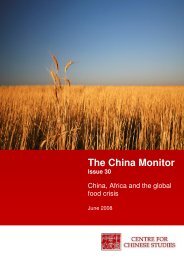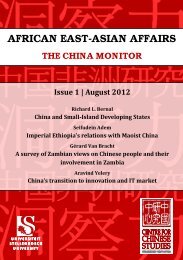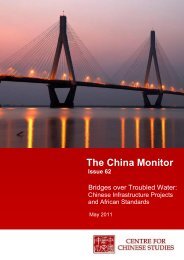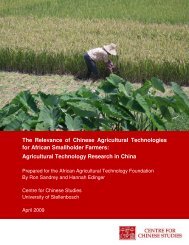The China Monitor - The Centre for Chinese Studies
The China Monitor - The Centre for Chinese Studies
The China Monitor - The Centre for Chinese Studies
You also want an ePaper? Increase the reach of your titles
YUMPU automatically turns print PDFs into web optimized ePapers that Google loves.
<strong>The</strong> <strong>China</strong> <strong>Monitor</strong><br />
April 2011<br />
Editorial<br />
Dear Reader,<br />
<strong>China</strong>‟s Africa policy is often suspected to be following a „great plan‟ and<br />
observers tend to speak of „the <strong>Chinese</strong>‟ as if everyone was following one<br />
strategy. Trade with <strong>China</strong> is often a matter of state-to-state deals providing a<br />
framework in which companies can operate, as highlighted in last month‟s <strong>China</strong><br />
<strong>Monitor</strong>. Yet, there is another side of the story that we would like to highlight this<br />
month. <strong>The</strong> discussion on the „macro‟ element of relations is incomplete without<br />
the „micro‟ level of individual decisions and actions.<br />
<strong>The</strong>re are general guidelines and basic policies, such as <strong>China</strong>‟s Africa policy of<br />
2006 or the „Going Out‟ Strategy of 2001. However, many interactions are based<br />
on individuals making use of opportunities, leading to „grassroot globalisation‟,<br />
as our author Yang Yang calls it. <strong>The</strong>se actions might be within the confines of<br />
policies <strong>for</strong>mulated in Beijing and in bi-national commissions – or they might go<br />
beyond it. Seeing „all <strong>Chinese</strong>‟ strive <strong>for</strong> the same thing is naïve and as wrong<br />
as the Western assumption that globalisation is simply „happening to‟ Africans.<br />
Small trader migration is arguably one of the issues that is beyond state<br />
command (or control) in <strong>China</strong>, too, as illustrated by the second piece, an<br />
account of joint research between Xiamen and Stellenbosch Universities. Some<br />
people simply grasp opportunities where they present themselves, irrespective<br />
of whether they are induced by Beijing or whichever their capital city might be. It<br />
is much rather a matter of personal risk calculations and entrepreneurship if<br />
these opportunities are sought within one‟s community or beyond – at times<br />
even in communities whose language and habit are <strong>for</strong>eign.<br />
It is intriguing to see how similar patterns <strong>for</strong> migration are between those<br />
African that seek opportunities in <strong>China</strong> and those <strong>Chinese</strong> that seek<br />
opportunities in (South) Africa. On both sides, determining factors are family<br />
bonds, loyalties to the own group, and rational considerations of where<br />
opportunities are. It is only in the latter point that state policies come into the<br />
picture when Africans or <strong>Chinese</strong> are taking individual decisions on their lives.<br />
<strong>The</strong>y are an obvious – if not THE most obvious – element in Sino-African<br />
relations that needs to be researched and understood.<br />
Yours sincerely,<br />
Dr. Sven Grimm<br />
Director, <strong>Centre</strong> <strong>for</strong> <strong>Chinese</strong> <strong>Studies</strong><br />
© <strong>Centre</strong> <strong>for</strong> <strong>Chinese</strong> <strong>Studies</strong>, Stellenbosch University; All Rights Reserved<br />
3



